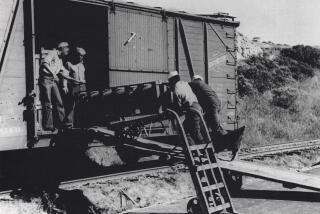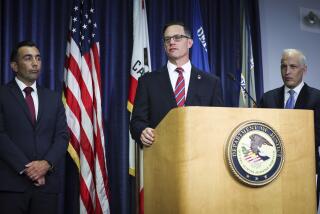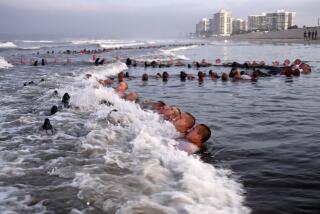Mutiny Charge Against Muslim Sailors Dropped : Gulf War: Navy does abrupt about-face, vindicating two sailors accused of plotting to take over the aircraft carrier Ranger.
The Navy on Thursday abruptly dropped all charges against two U.S. sailors accused of plotting to take over the San Diego-based aircraft carrier Ranger to aid Iraq during the Gulf War, officials said.
The decision vindicates Airman Apprentice Abdul Shaheed, 22, and Seaman Apprentice James L. Moss, 21, both Muslims, according to their lawyers, who also said the initial charges were an overreaction by Navy officials.
“This was an overreaction from all sources,” Lt. Victor Bernson Jr., Shaheed’s Navy-appointed attorney, said from the Philippines. “There was substantial evidence that both Shaheed and Moss were merely peaceful Muslims. They never supported Saddam Hussein in any way. There was also substantial evidence that the government’s key witnesses may have been less than credible.”
Shaheed said in an interview he believes the case against him was a result of religious discrimination and that he never, not even in jest, spoke of overthrowing the aircraft carrier Ranger.
“Frankly, the case is like exaggeration of exaggeration,” Shaheed said. “Being Muslim, we only have fear of Allah. You have trust in God, He’s the judge. He knows who is righteous--evidently, we were righteous because we prevailed.”
The move to drop the charges followed a three-week fact-finding visit by three attorneys to the Ranger as it steams home from the Gulf.
During the weeks aboard the carrier, the defense attorneys interviewed more than 50 crew members, who supported Shaheed and Moss and also discredited the government’s three witnesses.
“We had people by the dozens wanting to line up and talk to us,” said Lt. Brendan Ward, Moss’ attorney, who returned with Bernson on Wednesday to their legal offices in Subic Bay, Philippines. “There was never any evidence--this whole story was concocted by one individual.”
Shaheed and Moss were ordered in April to stand trial next week for alleged offenses that occured Jan. 17 in the Persian Gulf, the night that the U.S began bombing Iraqi.
The two were initially charged with “urging disloyalty, mutiny or refusal of duty” and were accused of plotting to kidnap the carrier’s skipper, sabotage the ship’s catapult launch and engineering systems. Navy officials, however, never made clear how the two would have accomplished such a feat.
After the Gulf War, the charges were reduced to making disloyal statements, a violation punishable by a maximum of 10 years in prison.
Shaheed and Moss countered that the key witness against them, Airman Apprentice Gregory Jones, had fabricated his tale of sabotage and mutiny.
Shaheed and Moss flew to Subic Bay so Navy officials could investigate the incident. And last month, their attorneys, along with Navy prosecutor Lt. Cmdr. Alan Beal, visited the carrier to continue the investigation.
After the trip, the government’s case crumbled.
The key witness, Ward said, “was a very cunning liar. He’s a very deceptive, manipulative, untruthful person with great ability to exaggerate and imagine things.”
Ward said he believes the case may have snowballed because it coincided with the beginning of the U.S. air campaign in the Gulf. The Ranger’s commanding officer, Capt. Ernest Christiansen, could not afford to allow possible saboteurs to freely roam his ship at such a crucial time--a fact that Jones probably counted on, Ward said.
Jones, too, had a motive--he wanted to get off the ship, the attorney said. Jones apparently believed that he would be taken off because he told other crew members that the Muslim sect was threatening his life, Ward said. He assumed the Navy would remove him from the vessel for his own safety, crew members told the attorneys.
It is not yet known what, if any, action might be taken against Jones.
Shaheed and Moss were notified Thursday that the Navy had withdrawn the charges against them and canceled next week’s court martial.
A jubilant Shaheed said he is mulling over his options.
“I am still debating whether to stay in the Navy or get out,” said the Brooklyn, N.Y., native who has served 3 1/2 years in the Navy. “I am trying to organize my life and career to see a more positive future.”
A month before the incident erupted, Moss filed for conscientious objector status--which he still hopes to obtain, Ward said.
Shaheed, who became a practicing Muslim two years ago, said he believes the Navy created the unusual case against him and Moss because of their religion.
“It’s because the Navy lacks understanding of the Muslim religion. There really is not any representation of Muslims in the military--they really don’t have any understanding of it,” he said.
For both Shaheed and Moss--who joined the Navy 1 1/2 years ago--the incident will leave no blemish on their records, Bernson said. But he added that it was doubtful that either man would fly out to the Ranger as it steams home to San Diego. “This has been an extraordinary situation,” he said.
Both Bernson and Shaheed said they hoped the resolution would ease difficulties experienced by other practicing Muslims in the armed forces. Muslims frequently encounter trouble finding a time and place to pray, as their religion requires, three to five times a day aboard sea-going ships.
“Muslims in the military are going to find things are much more amenable to both serving their country and practicing their religion,” Bernson said. “I really do believe some good will come of this.”
More to Read
Sign up for Essential California
The most important California stories and recommendations in your inbox every morning.
You may occasionally receive promotional content from the Los Angeles Times.










